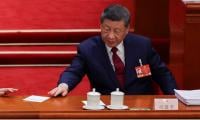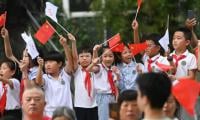Counting PWDs in census impossible due to unavailability of disability column in main form
Islamabad
Main census form developed by the government does not carry a disability column making it impossible to count the number of Persons with Disability (PWDs) during the upcoming census.
The concern was raised at a press conference organized by the Special Talent Exchange (STEP) under the platform of Aging Disability Task Force (ADTF). The task force includes STEP, Sightsavers, Handicap International, CBM, HelpAge International, LCDDP, Milestone and ASHA and Launch of a Campaign ‘Do Count Us’ (Hamain Shumar Karo).
The speakers stressed the need of data collection of PWDs as it will provide the exact number of persons with disabilities making it possible to work on the barriers they face in a specific location due to specific form of disability. They said that disaggregation of data by disability is a key step in including persons with disabilities who encounter higher rates of poverty and exclusion from society.
Chief Executive Officer for National Forum of Women with Disability Abia Akram said that it is critical to remember that persons with disabilities (10 to 15% of the total population) are amongst the most likely segment of the society to live in poverty, to be denied their development rights, their right to makes choices over their bodies, to achieve justice and remedies when experiencing gender based violence, to enjoy their right to education, meaningful and decent work, to control resources and to participate in public life.
She said that the issue has been raised by the Parliamentarians at the floor of the house but they were told that the forms have already been printed and there can be no change in the forms at this stage. “All we want is to attach a separate paper with the form, make changes in the software and train the data collectors on collection of information on PWDs,” she said suggesting that census is an opportunity to finally make the right and targeted policies for PWDs.
Abia said that people, especially in rural areas, tend to hide information about the PWDs in their families. “Comprehensive research on questions for PWDs for the census has already been in the developed countries. We suggest that if ‘Washington Group of Questions for PWDs’ are attached with the form, we will be able to get a clearer picture on the PWD data,” said Abia.
Director General of Special Education Institutions for National Training Centre for Special persons talked about the barriers faced by the persons with disability in education sector. Ali Shabbar from STEP talked about the importance of disaggregation of data by disability.
Rabia Hadi from Elimination of Violence against Women and Girls Alliance termed it concerning that PWDs were first ensured by the government that special columns for disability will be included in the main census form but it was not there in the final form.
Fariha Bajwa from National Commission on the Status of Women said that the first barrier that persons with disabilities encounter is statistics. If the government does not know the number of people who need specific intervention, treatment, training and rehabilitation, the budgetary allocations can never meet the needs.
Speakers said that the government policies that privatize public services, reduce the commons and value economic growth over human rights have a devastating impact on persons with disabilities particularly women with disabilities. “This is not just a human rights argument to inclusion, but also a strong economic one. The International Labour Organisation (ILO) estimates that the economic losses incurred through excluding persons with disabilities from the world of work are as high as 3-7 per cent of global GDP,” they said adding that failing to address these issues is going to impact on the country’s ability to achieve the UN’s Sustainable Development Goals, especially given their motto ‘Leave No One Behind’.
-
 Nicole Kidman's Daughter Sunday Rose Under Intense Backlash Post-Keith Urban Divorce
Nicole Kidman's Daughter Sunday Rose Under Intense Backlash Post-Keith Urban Divorce -
 Teddi Mellencamp Reveals Medication Side-effects Landed Her In The Hospital
Teddi Mellencamp Reveals Medication Side-effects Landed Her In The Hospital -
 Chase Stokes Calls Out Morgan Evans Over Comments On Kelsea Ballerini Split
Chase Stokes Calls Out Morgan Evans Over Comments On Kelsea Ballerini Split -
 Elon Musk Says Legal Pressure Forced Him To Pay Full Price For Twitter
Elon Musk Says Legal Pressure Forced Him To Pay Full Price For Twitter -
 Sarah Ferguson’s Downfall & Housing Crisis: Pals Make A Decision On Radioactive Ex-Duchess
Sarah Ferguson’s Downfall & Housing Crisis: Pals Make A Decision On Radioactive Ex-Duchess -
 Taylor Swift Faces Awkward Situation Ahead Of Her Wedding To Travis Kelce
Taylor Swift Faces Awkward Situation Ahead Of Her Wedding To Travis Kelce -
 Anthropic, Pentagon Resume Talks On ‘high Stakes’ AI Defense Deal
Anthropic, Pentagon Resume Talks On ‘high Stakes’ AI Defense Deal -
 OpenAI Annualized Revenue Hits $25 Billion Milestone Amid Global Adoption Surge
OpenAI Annualized Revenue Hits $25 Billion Milestone Amid Global Adoption Surge -
 Princesses Beatrice, Eugenie’s Parents Hurt Their Future With William, Kate: ‘The Knives Are Out’
Princesses Beatrice, Eugenie’s Parents Hurt Their Future With William, Kate: ‘The Knives Are Out’ -
 Billy Porter Claims He Came Back From The Dead Amid Sepsis Battle
Billy Porter Claims He Came Back From The Dead Amid Sepsis Battle -
 Jason Dickinson Reportedly Headed To Oilers In Trade With Chicago Blackhawks
Jason Dickinson Reportedly Headed To Oilers In Trade With Chicago Blackhawks -
 Harry Styles Hints He's Ready For Marriage And Family Life
Harry Styles Hints He's Ready For Marriage And Family Life -
 David Harbour’s Ex Faced Extreme Humiliation At Lily Allen’s Producer's Birthday Bash
David Harbour’s Ex Faced Extreme Humiliation At Lily Allen’s Producer's Birthday Bash -
 China Targets Tech Innovations Amid High Stakes Rivalry With US: Key Strategies Explained
China Targets Tech Innovations Amid High Stakes Rivalry With US: Key Strategies Explained -
 Pacers Vs Clippers: Kawhi Leonard Powers Clippers Past Pacers For Third Straight Win
Pacers Vs Clippers: Kawhi Leonard Powers Clippers Past Pacers For Third Straight Win -
 Scientists Build Tiny AI Brain Model Using Monkey Neurone Data
Scientists Build Tiny AI Brain Model Using Monkey Neurone Data



